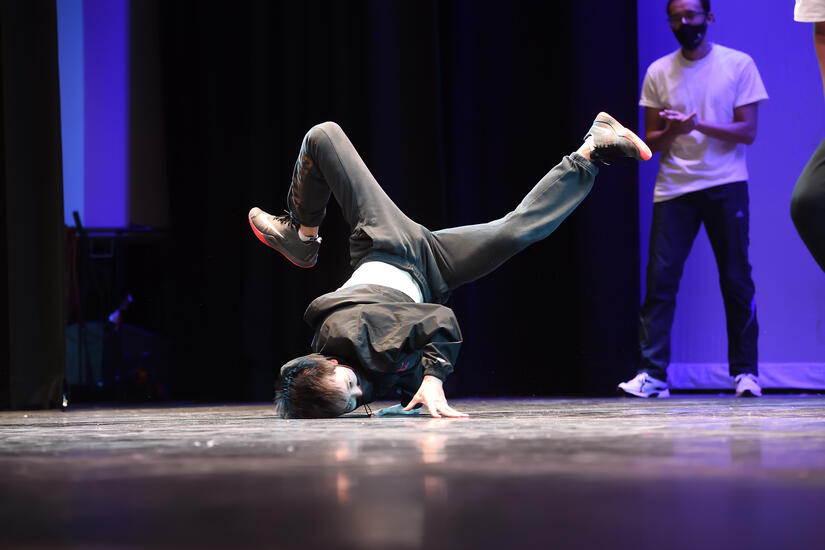A new sport has broken its way into the 2024 Olympics.
Breakdancing, also known as breaking, will make its Olympics debut in Paris later this month for what might be the most widely watched dance battles in history. B-boys and b-girls from around the world will compete head-to-head in two tournament-style competitions (men's and women's) to see which breakers take home gold.
It's been a long road to the Olympic podium for breakdancing. The dance style first originated in the Bronx during the 1960s and '70s, where Black and Latino dancers mixed Hip Hop moves with martial arts and gymnastics techniques. Breakdancing then gained mainstream popularity in the '80s, with the first international competitions held in the 1990s.
According to Olympics officials, breaking was added to this year's Summer Games as part of an ongoing modernization effort. The 2020 Tokyo Olympics featured several new sports aimed at bringing in younger audiences, including skateboarding, sport climbing, and surfing. Breaking, which has gained international popularity over the past few decades, is the latest addition.

Image caption: Brinae Ali
Image credit: Johns Hopkins Peabody Institute
According to Peabody dance faculty Brinae Ali, considering how popular breakdancing has become, it makes sense that the Olympics would want to get in on the action.
"It has a large following," Ali said. "Young people are actually showing up and participating in these dance battles around the world. ... Its roots are in America [and the] Black American experience, but it has definitely gone global."
Despite the sport's New York City roots, many of this year's top-seeded breakers come from the Netherlands, France, and Japan. In total, breakers from 16 countries have qualified for Paris, including four representing the United States: B-boys Jeffro and Victor and b-girls Logistx and Sunny.
For Ali and other breakdancing fans, the sheer athleticism and artistry necessary to excel in the sport make it captivating to watch. Moves are completely improvised, with breakers competing against each other in head-to-head rounds while a DJ spins music.
Moves are split into three main categories: Top rock, down rock, and freezes. Top rock refers to moves performed while standing, while down rock is any move performed on the floor. Freezes, meanwhile, occur when the breaker performs a total stop. Such moves are usually in a difficult-to-hold position, such as balancing on one's head or hand.

Image caption: A performance by the JHU Breakers Crew.
Image credit: Will Kirk / Johns Hopkins University
But winning a battle isn't just about performing challenging moves. Although scoring methods vary from competition to competition, this year's Olympic judges will score breakers based on five subjective criteria:
- Vocabulary: Variation and quantity of moves
- Musicality: Rhythm and synchronicity
- Originality: Personality and improvisation
- Technique: Form and athleticism
- Execution: Cleanliness and storytelling
For example, if a breaker performs a wide variety of moves but ignores the rhythm of the track, they'll fare well in vocabulary and poorly in musicality. Both technical skill and creativity must be balanced to win.
"I love the fact that [the Olympics] are trying to stay true to what you would normally see at any other battle," Ali said. "Battle competitions require musicality, skillset, [and] personality."
Olympic breakers will have one minute each to impress the judges, who will then score the criteria on "digital sliders." For example, if Breaker 1 has better originality than Breaker 2, then that slider will be moved further in Breaker 1's direction.
According to Ali, some level of aggressiveness should be expected during a breakdancing battle. Actions that would seem disrespectful or confrontational in other sports are considered part of the fun.
"That kind of behavior can be confusing to people who don't understand it," she said.
With this in mind, Ali expressed some concern that the Olympics will sanitize the event to appeal to a wider audience. Breaking is a sport steeped in culture, and sanding off the edges might defeat the purpose of including it in the first place. But Ali also pointed out that a lot of passionate and experienced breakers will be involved at the Olympics, both as competitors and as judges. Whether her fears are founded remains to be seen.
Though Olympic breakdancing will debut in Paris, the sport isn't here to stay. Organizers for the 2028 Olympics in Los Angeles have already announced that breaking won't be included, meaning this summer might be the world's only chance to see the sport on the Olympic stage.
"[Removing breaking] proves my point on the devaluing of our own culture and internal racial biases that exist here in America," Ali said. "It's wild how European countries as well as other places in the world ... value this art form and skillset more than we do. It will be very interesting to see what happens after this year's competition."
Even if breaking never returns to the Olympics, Ali knows that the sport will continue to thrive.
"The Olympics is not the pinnacle of breakdancing," she said. "But I think that it is nice to have options on a larger platform for [breakers] to aspire to. ... Do I see that as a win for the culture? I don't know yet. But that's all the more reason why I want to watch."






